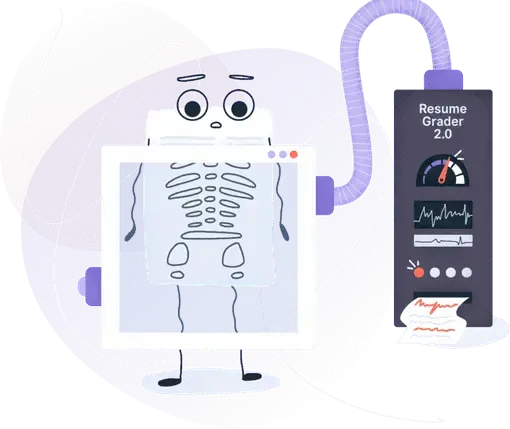Cooking Skills: Example Usage on Resumes, Skill Set & Top Keywords in 2025
Adding cooking to your resume suggests a flair for creativity and the ability to thrive in fast-paced environments; it also accentuates your problem-solving skills and adaptability. Dive into the guide below for inspiration on refining your resume and discovering alternative skills that highlight your capabilities.


Is your resume ATS-friendly?
Drop your resume here or upload a file to find out if the skills in your resume are readable by an ATS.
Cooking skill refers to the ability to prepare food with competence and confidence. This skill involves a range of techniques from basic chopping and frying to creating intricate dishes. When included in a resume, it highlights a person's capacity to follow instructions, manage time effectively, and adapt to new challenges. It also suggests creativity, commitment to quality, and the capacity for planning and multitasking.
However, mentioning your cooking skills on a professional resume can have drawbacks unless you're applying for a job in the food industry. It may seem irrelevant for non-culinary positions and could detract from other professional qualifications. Instead, showcasing transferable skills gained through cooking, such as attention to detail or project management, would be more beneficial. It's wise to connect your cooking experience to traits that are valuable in your field.
In this article, you will learn:
- Some drawbacks of adding cooking as a skill on your resume.
- How to highlight transferable skills from cooking when applying for non-culinary jobs.
- Examples of good and bad ways to present cooking skills, along with synonyms and alternative phrases.
Misusage of cooking on resumes
Having cooking skills can be an attractive addition to your resume if you're applying for a job in the food industry. However, shoehorning this skill into sections where it doesn't belong can confuse potential employers about your qualifications and distract from your relevant experience.
Examples of misusing cooking skill on a resume:
- In the summary section: "Expert in high-pressure environments, having honed my skills in the kitchen, I bring the same level of heat to financial analysis."
- In the experience section: "Managed a complex stock portfolio while also being responsible for the team's weekly meal prep, showcasing my culinary prowess under stressful conditions."
- In the achievements section: "Successfully increased company revenue by 20% and also won the employee chili cook-off three years in a row."
How to demonstrate cooking skills on your resume
- List your professional cooking experience, including the roles you have held and the type of cuisine you specialize in, highlighting any prominent restaurants or kitchens where you have worked.
- Include specifics about kitchen skills you possess, such as knife techniques, expertise in particular cooking methods (e.g., grilling, baking, sautéing), or experience with international cuisines.
- Detail any formal culinary training or education you have completed, as well as any certifications such as food safety or specialized cooking courses.
- Describe achievements that demonstrate your cooking skill, such as awards won, recognition from restaurant reviews, or positive feedback from supervisors or clientele.
- Provide examples of menu development or special dishes you have created, showcasing your creativity and ability to adapt to different ingredients and dietary needs.
Example 1: Demonstrate cooking in the experience section
- •Spearheaded menu redevelopment project, introducing 15 new dishes that led to a 20% increase in customer satisfaction ratings.
- •Managed a team of 10 kitchen staff, fostering a collaborative environment that cut food preparation times by 35%.
- •Implemented a waste reduction strategy that saved the restaurant $5,000 annually and reduced food waste by 28%.
- •Directed a high-volume kitchen, catering to an average of 300 diners per night with a customer return rate of over 60%.
- •Conducted supplier negotiations to cut costs by 15%, resulting in a more cost-efficient operation with better quality ingredients.
- •Oversaw a seasonal menu overhaul in partnership with local farmers, directly tying the kitchen’s creations to sustainable practices.
- •Developed a high-efficiency rotating system for food preparation tasks, allowing the team to handle peak periods effectively.
- •Played a key role in a group initiative to reimagine comfort food classics, contributing to a 40% growth in brand recognition.
- •Participated in weekly inventory management, reducing ingredient overstock by 22% through more accurate forecasting.
- This resume avoids empty buzzwords and instead provides concrete evidence of the applicant’s skills and achievements in a cooking environment.
- Each bullet point demonstrates the candidate's direct contribution to business outcomes, like improving satisfaction ratings or reducing costs.
- The work experiences are recent, relevant, and show a progression in roles and responsibilities, reflecting an upward career trajectory.
- The use of specific numbers and results in every bullet point makes it clear what the applicant has achieved, offering a measurable impact.
- Clear language makes this resume easily understandable, fitting for a diverse range of readers, without compromising on essential details.
Example 2: Demonstrate cooking in the summary section
- This summary explicitly showcases the applicant’s practical experience in the culinary field with a decade of hands-on expertise.
- The reference to employment at a Michelin-starred restaurant indicates a high level of skill and familiarity with elite dining standards.
- The mention of a specific achievement like the introduction of a successful signature dish illustrates tangible success and impact in their role.
- The applicant communicates a genuine passion for cooking, emphasizing a congruence between their personal interests and professional pursuits, which is appealing to employers.
- The absence of common buzzwords and jargon makes the summary sincere and straightforward, focusing on actual accomplishments and skills.
- The candidate's ability to enhance customer experience through their culinary creations is clearly stated, signifying a customer-centric approach.
- By stating the applicant's enthusiasm without verbosity, the summary remains engaging and concise, making it an excellent example for someone looking to highlight excel skills effectively.
Example 3: Demonstrate cooking in the achievements section
- The titles are brief and convey key responsibilities or accomplishments.
- Descriptions give specific numbers and results, showcasing the impact of the applicant’s work.
- The examples are based on real work situations, adding credibility.
- No overused buzzwords are used, which makes the content appear genuine.
- Language is simple, making the content accessible to readers at various levels.
- Each achievement is concise but packed with information that would be valuable to a potential employer.
What are the relevant certifications for cooking skills on resume
Here is a list of widely-recognized certifications beneficial for enhancing your cooking skills and credentials:
The top 5 certifications for gaining cooking skills expertise:
Top skills people add together with cooking skill on resume:
Baking
Food Safety
Culinary Arts
Food Preparation
Pastry Making
Nutrition
Recipe Development
Food Presentation
Catering
Menu Planning
Time Management
Creativity
Attention to Detail
Teamwork
Flexibility
Stress Tolerance
Organization
Problem-Solving
Customer Service
Passion for Food
Communication
Most relevant jobs for cooking skills
If you have a passion for cooking and creating delicious food, there are several career paths where your culinary talents can shine. Cooking skills are highly valued in many professions, particularly those associated with the food and hospitality industry. A job that involves cooking can be incredibly rewarding, as it not only allows you to express your creativity but also brings joy to others through your dishes. Here's a list of popular jobs where your ability to cook can play a central role.
- Chef
- Line cook
- Pastry chef
- Personal chef
- Caterer
- Food stylist
- Food service manager
- Culinary instructor
- Recipe developer
- Kitchen manager
Key takeaways
- Cooking skill on your resume can showcase versatility and the ability to acquire new competencies.
- Avoid overstating your culinary expertise or citing irrelevant experience to the job.
- Showcase your cooking ability on your resume by highlighting relevant experiences, such as roles in food service or specific cooking courses completed.
Make one that's truly you.




